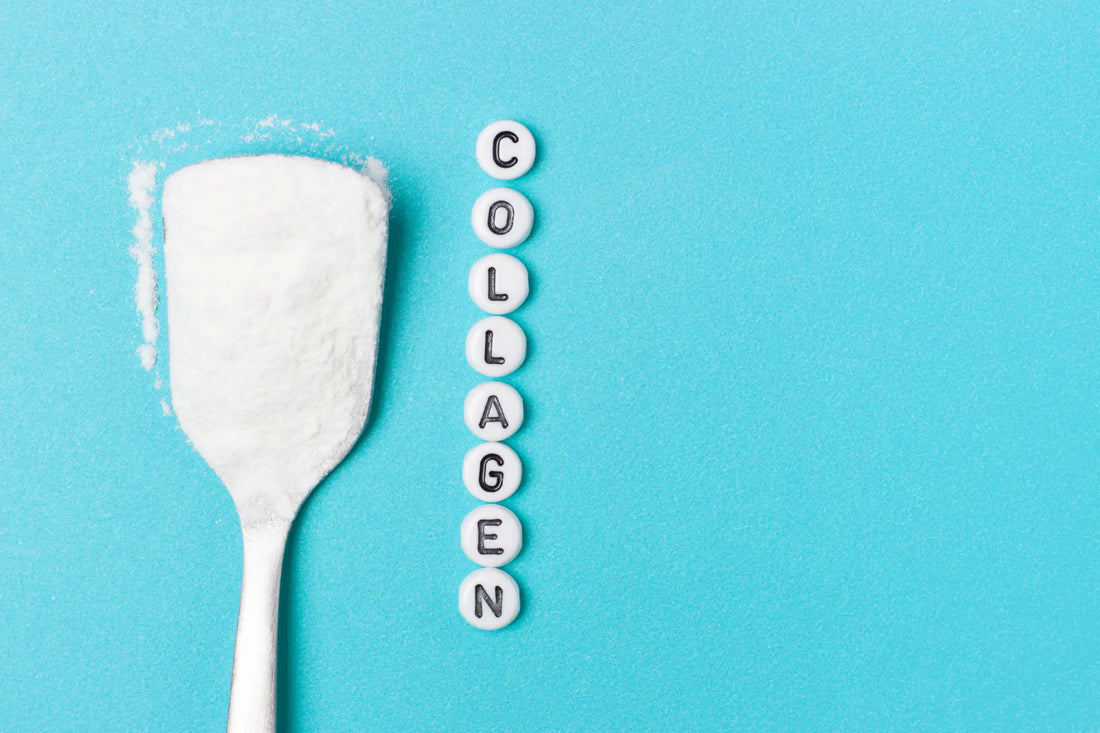

The Ultimate Guide to Preserving and Boosting Collagen
In the overwhelming world of health and beauty products, one ingredient currently stands out: collagen. It's become a popular term for achieving youthful, healthy skin, but it's also an important part of our body's natural function. So, let's embark on a journey to unravel the secrets of collagen, how to increase collagen in skin, and how to increase collagen naturally.
What is Collagen?
Collagen is the most abundant protein in our bodies, often referred to as the "glue" that holds everything together. It is a fibrous protein that makes up a significant portion of our skin, bones, muscles, tendons, and ligaments. Imagine it as a support that provides strength and structure to our skin, adding resilience and elasticity.
But collagen isn't a one-size-fits-all solution. There are at least 16 different types, each with a specific job. In our skin, types I, II, and III play a starring role. They work together to keep it firm, supple, and constantly renewing cells. Collagen even helps us heal faster by supporting tissue repair, a crucial part of the body's natural healing process.
Importance of Collagen for Skin
When it comes to beauty, collagen reigns supreme. It's the foundation for a youthful complexion, responsible for that bouncy, plump, and wrinkle-free skin. Collagen fibers form a supportive network that keeps your skin elastic and structured, allowing it to bounce back from everyday movements. But as we age, collagen production slows down, leading to the dreaded signs of aging – fine lines, wrinkles, and sagging skin. This is why protecting the collagen levels in your skin and using methods on how to increase collagen in skin become crucial for maintaining a youthful appearance.
The quest on how to increase collagen in skin begins with understanding the importance of preserving and enhancing it. From tapping into the best collagen supplements to chewing on a collagen booster, the options are varied and can have significant impacts. Not only does collagen maintain the integrity of our skin, but it also affects joint health and the strength of our hair and nails.
If we can slow down the rate at which collagen degrades and stimulate its production, we're well on our way to not only looking better but feeling better too. While collagen is well-known for its beauty benefits, it also plays a crucial role in maintaining a healthy gut and preventing chronic inflammation.
How to Increase Collagen Naturally
The connection between diet and collagen production is not merely an old wives' tale. It’s backed by science. Our bodies require a combination of nutrients, including amino acids, vitamins, and minerals to produce collagen efficiently helping your skin from the inside out as well as overall well-being. By ensuring these are abundant in your diet, you can understand how to increase collagen naturally in your body and can lay the ground for a more radiant complexion.
If you are thinking about how to increase collagen naturally, here’s a list of collagen-rich foods to include in your diet:
1. Protein Sources (Fish, Poultry, and Meat)
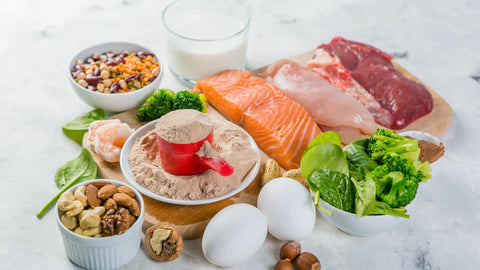
Since protein is the main component of collagen, diets high in protein are necessary for collagen synthesis. Lean meats like turkey, chicken, and beef, along with seafood like salmon and tuna, supply you with plenty of amino acids like glycine, proline, and hydroxyproline—all essential for synthesizing collagen.
2. Fruits and Vegetables
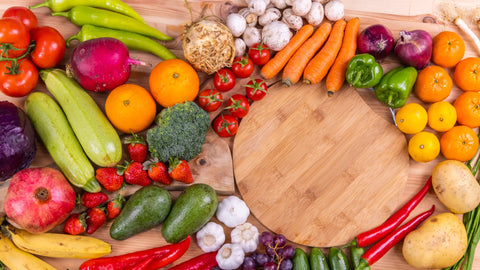
Fruits and Vegetables are rich sources of antioxidants, vitamins, and minerals. Berries, citrus fruits, and leafy vegetables offer Vitamin A and C essential for collagen-boosting and skin health. Berries such as Strawberries, Blueberries, and raspberries are packed with Vitamin C which helps in Collagen synthesis. Citrus fruits like oranges and lemons are packed with Vitamin C, while leafy greens such as spinach and kale offer Vitamin A, including them in your diet can help you to increase collagen naturally
3. Healthy Fats (Avocado, Nuts, Olive Oil)
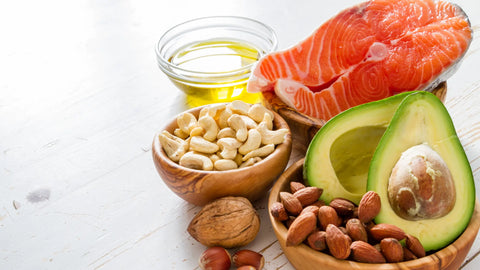
Maintaining skin moisture and elasticity—two critical components of collagen health—requires consuming healthy fats. Rich in monounsaturated fats and vitamin E, avocado, nuts, and seeds help to nourish and produce collagen in the skin. Including olive oil in your diet offers collagen synthesis help in addition to providing healthy fats and anti-inflammatory qualities.
4. Bone Broth and Collagen-Boosting Drinks

Simmering animal bones and connective tissue to create bone broth releases collagen, amino acids, and minerals like calcium and magnesium. Regularly consuming bone broth can promote joint health and help restore collagen levels. Furthermore, smoothies enhanced with collagen peptides and other collagen-boosting beverages like green tea provide a handy means of augmenting collagen production.
5. Dairy Products
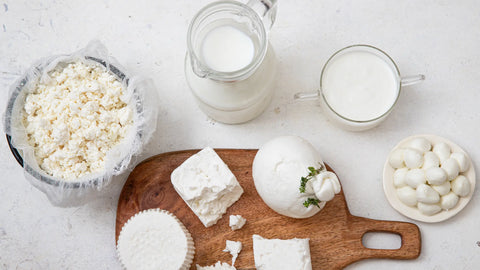
Whey and casein, two proteins found in dairy products like yogurt and cheese, aid in the formation of collagen. Dairy products also include a lot of calcium, which is important for maintaining the strength and density of bones and the general health of collagen.
6. Herbs and Spices
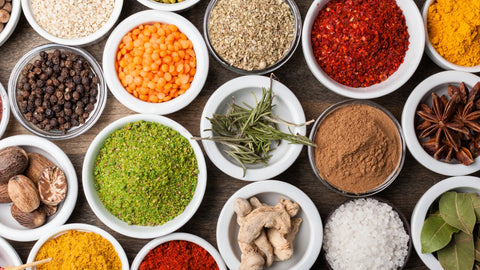
Incorporating herbs and spices into your meals can not only enhance flavors but also support collagen production. Herbs like turmeric and ginger have anti-inflammatory properties that help protect collagen from degradation. Spices such as cinnamon and cloves offer antioxidant effects, helping with stress reduction and collagen production.
Collagen Supplements
While our bodies naturally produce collagen, factors like aging, poor dietary choices, and environmental stressors can diminish its levels, leading to various health issues such as joint pain, wrinkles, and weakened bones. Collagen supplements have gained popularity for their potential to improve skin elasticity, joint health, and overall well-being. Numerous studies support their efficacy, demonstrating improvements in skin hydration, elasticity, and wrinkle reduction. Incorporating collagen boosters into your daily routine can help replenish lost collagen and support healthy aging from within.
Not all collagen supplements are created equal! So here are factors to consider when thinking about which supplements help and how to increase collagen in skin:
- Collagen Type: Different types target different needs.
- Source: Marine Vegan or bovine collagen are common options.
- Ingredient Check: Watch out for added sugars or fillers.
- Trustworthy Brands: Look for third-party testing and certifications.
- Dosage and Form: Choose the amount and format (powder, capsule, liquid) that suits you best.
Lifestyle Modifications
Adopting specific lifestyle modifications can help maintain current collagen levels and promote collagen synthesis naturally in addition to supplementation. Wearing sunscreen daily is essential for shielding your skin from damaging UV rays, which can delay the aging process and degrade collagen. Similarly, abstaining from smoking and heavy alcohol use can support the integrity of collagen and improve the general health of the skin. Smoking has been found to hasten the breakdown of collagen and hinder the healing of wounds, whereas alcohol use can cause dehydration and inflammation, both of which worsen collagen degradation.
Stress management is crucial for maintaining collagen since prolonged stress has been connected to both accelerated aging and collagen depletion. Stress levels can be lowered and collagen can be supported by incorporating relaxation practices like yoga, meditation, and deep breathing exercises into your daily routine.
Effective Skin Care Regime
Apart from internal tactics, skincare is essential for maintaining the health of collagen and enhancing the appearance of youthful skin. Maintaining skin elasticity and preventing collagen loss can be achieved with a daily skincare regimen that includes mild washing, exfoliation, moisturizing, and protection from the sun. Look for components like retinol, vitamin C, peptides, and hyaluronic acid in skincare products as these are believed to increase the formation of collagen. These components aid in promoting the production of collagen, enhancing the texture of the skin, and lessening the visibility of wrinkles and fine lines.
A skincare regimen that aims to preserve collagen and maintain skin health must include both hydration and moisturization. Sufficient levels of moisture in the skin contribute to the formation of a barrier that stops water loss and preserves ideal levels of hydration. Hydrating elements including ceramides, glycerin, and hyaluronic acid are found in moisturizers that help to maintain the integrity of collagen and restore moisture levels. Furthermore, maintaining skin moisture and preventing collagen depletion in dry settings can be achieved by utilizing a humidifier. You can feed and shield your skin, supporting the preservation of collagen and general skin health, by adding moisturization to your regular skincare routine.
Professional Treatments
Achieving vibrant, youthful skin is a desire shared by many, and collagen plays a pivotal role in realizing this goal. As the foundation of skin elasticity and resilience, collagen preservation and enhancement are key components of any effective skincare regimen. While topical products and dietary choices contribute to collagen health, professional treatments also offer additional support for natural collagen production. You must be wondering how to increase collagen in your skin via professional treatments. Advanced skincare techniques like microneedling and laser treatments aim to enhance skin tone and texture while promoting the generation of collagen. These procedures function by intentionally inflicting tiny wounds on the skin, which sets off the body's innate healing process and collagen production. Laser treatments use concentrated light energy to target specific skin issues, while micro-needling, also called collagen induction therapy, uses small needles to pierce the skin's surface. In addition to encouraging collagen remodeling, these methods can lessen the visibility of wrinkles, scars, and uneven pigmentation. Microneedling and laser treatments revitalize the skin from within, resulting in a smoother, more youthful complexion by increasing the production of collagen.
Including Exercise and Rest to Promote Collagen Health
Rest and physical activity are essential for maintaining the health of collagen and enhancing general well-being. Frequent exercise increases blood flow, which provides the skin cells with nutrients and oxygen necessary for the creation of collagen. Exercises that preserve skin suppleness and stop collagen degradation include yoga, pilates, and strength training. For collagen health, getting enough sleep is just as important as getting enough rest, since not getting enough sleep can hinder the creation of collagen and cause premature aging. Optimizing collagen synthesis and promoting skin regeneration can be achieved by making relaxation techniques a priority and implementing a regular sleep pattern. Furthermore, stress-induced collagen breakdown can be minimized and skin resilience can be supported by using effective stress management techniques including mindfulness, deep breathing, and meditation.
To wrap up, bolstering your body's collagen production isn't about taking extraordinary measures but about making informed, straightforward choices in your diet and lifestyle. By integrating these strategies, you’re not just committing to healthier skin, but to a healthier you. Take those baby steps every day to #BeBetterEveryday and watch as your body's natural resilience shines through.
Also Read: Difference Between Marine, Bovine & Vegan Collagen